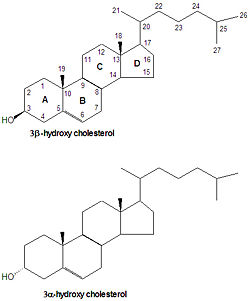Cholesterol
Cholesterol is a lipid that is the "principal sterol of all higher animals, distributed in body tissues, especially the brain and spinal cord, and in animal fats and oils."[1]
There is much confusion, in the lay press, between cholesterol itself, and the lipoproteins that carry it in the blood. References to "bad cholesterol" are misleading because cholesterol is cholesterol, but low-density lipoproteins (LDL) tend to increase atherosclerosis while high-density lipoproteins (HDL) tend to decrease it.
Disorders of cholesterol
Hypercholesterolemia may contribute to coronary heart disease, stroke, and other complications. Hypercholesterolemia may be treated by medications such as statins, bile acid sequestrants, fibric acid derivatives, and plant stanols. The effect, however, is less on cholesterol itself than on decreasing LDL or raising HDL.
Hypoalphalipoproteinemia is abnormally low levels of alpha-lipoproteins (high-density lipoproteins) in the blood. Low levels of high-density lipoproteins in the blood is a component of the metabolic syndrome.
References
- ↑ Anonymous (2024), Cholesterol (English). Medical Subject Headings. U.S. National Library of Medicine.


